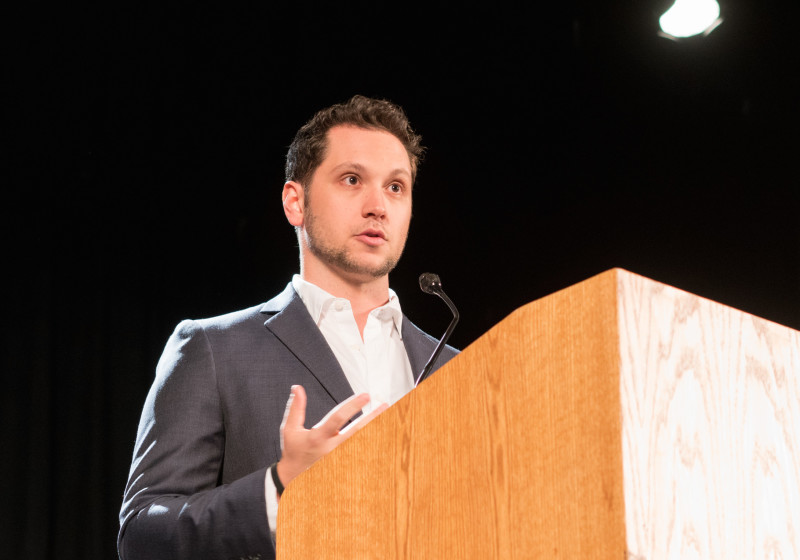Scott Abrams: As a part of the entertainment industry, I bet you notice that there are a lot of problems with diversity. Recently, that’s come to light with #OscarsSoWhite, but the shows that you are a part of feature some of the most diverse casts on television. Can you speak to that?
Matt McGorry: You know I’d like to take credit for saying that I purposely chose shows that had diverse casts, but it was sort of just the way it ended up working out, which was incredible. When you’re starting out as an actor, you take any opportunity that’s presented to you. I probably would have taken something on the whitest show on TV too, if it had come to it. You take what you can get.
Being fortunate enough to end up on shows like “Orange is the New Black” and “How to Get Away with Murder,” a lot of these shows get attention for their diversity: not just in the cast, but behind the cameras—writers, producers, creators— and I think that really called attention to it in a way that I hadn’t noticed before. It never occurred to me when I started working on “Orange” that I was the minority as a straight, white man. It wasn’t until it came out that I really started to notice, “Oh, this is not typical.” […] I’d like to think that, even if I wasn’t on shows that were so friendly to diversity, I’d still speak up the way I do, but it’s hard to know. […]
In terms of the #OscarsSoWhite, there’s been a lot of interesting commentary from people in the business about, you know, “Maybe they don’t deserve to win this year.” That may or may not be true, but the problem is that it overlooks the greater systemic problem in the industry, which is essentially the fact that, if there were more people of color in charge of greenlighting projects, or people in the Academy—which is 94 percent white, I believe—if there were more diversity in these places, the odds of more films being made with opportunities would be greater as well. […] An easy way to fix that is to make people aware of these issues and then filter some diversity in there and let there be an equal representation.
SA: It’s a similar thing with films about LGBTQ issues. “Carol,” for instance, was my favorite film of last year, but despite being one of the most critically acclaimed films of the year, was not nominated.
MM: I read an article about that that said that the problem that “critics,” which tend to overwhelmingly be straight men, saw about [“Carol,”] was not that it was a “women’s” film, but that it was a lesbian film not made for the male gaze. It wasn’t about men or how they fit in—again this is coming from someone who has not seen it, but I can easily imagine how this is the case. It’s interesting because, like everything else in the culture, [criticism is] from the perspective of straight, white men, and that automatically does not allow us to see it objectively. And that stuff matters because it will determine the awards it gets, it determines how much films like this in the future will get greenlit.
SA: What made you start to care and want to speak out about issues like these?
MM: It was kind of a couple of things for me that happened simultaneously. I heard about this Cosmopolitan article about male allies to women, and I ended up being one of the people that they were going to talk about, but this was before it was really an interest of mine. It was more the fact that I was on shows that were sort-of heavily female dominant. And part [of being interviewed for Cosmopolitan required] reading “Lean In” by Sheryl Sandberg, who was the COO of Facebook, and in that, she very specifically, clearly highlights a lot of ideas about sexism in the workplace and how it affects family life.
I don’t think the book was necessarily intended for men, but in some ways, it’s also important for men to see how a lot of these issues act simultaneously. I think it’s easy, as a person who’s in a position of privilege as society’s “default.” […] I think the book just laid out the entire—it’s basically just a long list of things that I would never have to deal with, [things] that would never occur to me.
SA: They all happen in a circle; they all affect each other.
MM: Exactly, it’s not as simple as a girl saying, “You’re a guy, you’re so lucky you don’t have to wear makeup to go out.” It’s like that plus 50 other things at the same time. And in the book is also the definition of feminism, which I never knew was as simple as believing in gender equality. This society has a lot of stigma attached to [feminism], particularly for men. A lot of men don’t feel comfortable identifying as [a feminist], don’t even know what it means and, even if they did, might feel a little weird about it. So I think the fact that I didn’t know what that meant was a big thing for me.
Also, I had been dating a girl who was trying to start a business and was going through a lot of these issues herself, having meetings with people that ended up not really being meetings: lunch turned into “Let’s make a dinner,” and dinner ended up actually being about it being a date. […]
Constantly trying to find the line between being friendly enough that people don’t think that you’re a “bitch” or that you’re “bossy,” which are terms that are never really used for men. And then also finding a line between being friendly enough that [you’re] not giving people an invitation to hit on you or think that this about more than that. At that point, I felt very frustrated, and there was no feedback that I could offer her. […]She had to play the game, and so it really made sense to me that someone who’s a man who’s in this position should go try to change the game.
The final [reason] was also Emma Watson’s speech at the UN where she asked at the end about trying to enlist men to help with gender equality. “If not me, who? And if not now, when?” And that hit me that someone has to do it. We can’t all just let it be someone else’s problem. All the men can’t let it be women’s problems.
SA: Do you ever feel that people think, “Oh, you’re a white man. What can you say about this?”
MM: The interesting thing with that was that it’s a fine line to always come back to [because] I can’t know what it’s like be discriminated against for the color of skin, or my gender, or my sexuality. So, even when people sometimes have really strong reactions, I do try to remind myself of that because it’s better to let the reaction happen. I don’t necessarily need to engage or defend myself. […]
And I think the criticism is important, and it’s important to learn from it. It wouldn’t be fair exactly for me to say that criticism should only happen in a certain way. […] I’ve never been a victim of this so I can’t know how emotional I would or wouldn’t be about it. […] There’s always going to be people who disagree with how you do it. Not to make a comparison here, but Martin Luther King and Malcolm X didn’t agree; Gloria Steinem and Betty Friedan didn’t agree. There’s a lot of disagreement about the highest level of people here. […]
And again this is such a tricky thing because, it’s very different for me as being in a position of privilege, it’s easy for me to say, “Hey, it will come around.” I can understand that maybe if I had been someone who had been pushed to the edge and marginalized this whole time, maybe [I’d] want [ignorant people] to come around now.
SA: What is your goal? What are you trying to accomplish by speaking out?
MM: I’ve always been a very careful goal setter. I think that keeps me motivated and keeps me from feeling burned out and hopeless. My goal [is] to do as much as I can to end issues of discrimination. I think that saving the goal of ending discrimination is different, because I don’t think that that will happen in my lifetime. What I have control over is how much responsibility I can take in my world and learning things and growing as a person and trying to affect change. But I obviously can’t control the fact that it will happen in my lifetime. But what that does for is allowing me to stay motivated, stay hungry, focus on what I’m doing and the fact that I can only do the best that I can.
I’d say for a lot of people the big thing would be sort of learning the concept of privilege. For me, I’ve never really met anyone who’s really deeply involved in these issues who doesn’t understand the concept of privilege. And what I mean by that understand that being a person of color has certain systemic discrimination systems built in to our culture that negatively affect them, but, as a result, I’m positively affected by that as well. It’s a balance. […]
For example, the idea of being a legacy in a school—the fact that I can be a legacy in a school if my parents were able to afford it, and they’d probably be more likely to afford it if I’ve come from a wealthy background. Historically, coming from a white family [helps] because whiteness typically is correlated with more income in the United States. It’s things like that if people kind of looked outside themselves a little more, they would start to see that there is a whole host of issues that don’t just involve blatant acts of sexism and racism.
And that’s the big thing that I’ve realized. Racism, sexism, homophobia: they exist on a spectrum. No one thinks that they’re a racist. […] Everyone has their own justification for it. So, we all have biases. I think the thing is that we can’t all say, “Oh, I don’t do this, therefore I’m not a part of it.” Because, whether you want to be or not, if you’re a man, you’re benefitting from the patriarchy. If you’re white, you’re benefitting from the way whiteness is in our culture. And we can’t escape that. When we look at it more as a spectrum, I think that maybe we take away people’s ability to throw their hands up and say, “Well, I’m not contributing to this, therefore I’m not a part of it.” […]
Systems of oppression do not end because people simply do not approve or do not contribute to racism. If we’re living in the era of slavery, simply saying that slavery sucks is not the thing that ends slavery. It’s fighting for it; it’s taking a stand; it’s being uncomfortable. And it’s putting yourself in a position where you will potentially make some sacrifices in your time to really stand up for those things.







